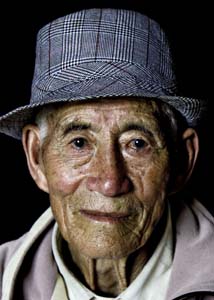Name: Nawang Jampa
(Alias: No)
Gender: Male
Interview Age: 86
Date of Birth: 1926
Birthplace: Chamda, Kham, Tibet
Year Left Tibet: 1959
Profession: Farming, Tailoring
Monk/Nun: Previously
Political Prisoner: No

Interview No.: 71D
Date: 2012-05-23
Language: Tibetan
Location: Mcleod Ganj, Dharamsala, Himachal Pradesh, India
Categories: Resistance and Revolution
Keywords: childhood memories, guerrillas in Mustang, Kham, monastic life, refugee in India -- life as, trade
Summary:
Nawang Jampa's father worked in the fields and also did tailoring. The family herded animals and produced dairy products. Nawang Jampa became a monk at Chamda Monastery and lived there for around 25 years. He alternated between living at the monastery when there were prayer sessions and living at home to help with the fieldwork.
Nawang Jampa recalls that he walked from his home in Kham to Shigatse in Utsang Province for nearly a month after the Chinese appeared in his region. He was around 30 years of age and became a transporter. He used mules to carry textiles for wealthy merchants between Phari and Shigatse.
Learning about His Holiness the Dalai Lama's escape, Nawang Jampa fled to Kalimpong in West Bengal, India. After working briefly on a road crew, he was told by the Chushi Gangdrug [Defend Tibet Volunteer Force] to join the Mustang Unit. He gives a brief description of his experience in Mustang, Nepal. He talks about the scarcity of food, living in tents and the guerrilla tactics they adopted in attacking Chinese convoys. The Nepalese forced the disbandment of this unit after Nawang Jampa had been there for 14 years. The group surrendered their arms and the men were imprisonment by the Nepalese for six months.
Interview Team:
- Marcella Adamski (Interviewer)
- Thupten Kelsang Dakpa (Interpreter)
- Pema Tashi (Videographer)

